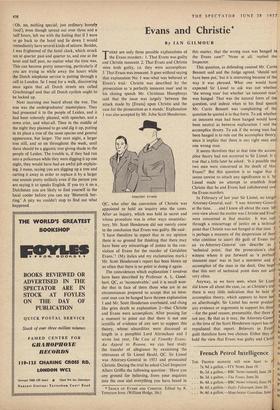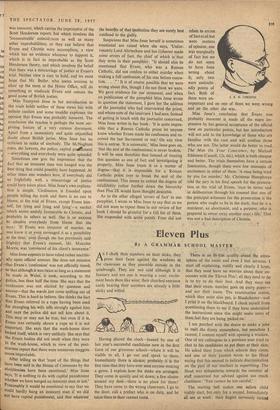Evans and Christie*
By IAN GILMOUR T11ERE are only three possible explanations of the Evans murders: I. That Evans was guilty and Christie innocent. 2. That Evans and Christie were both guilty, i.e. they were accomplices. 3. That Evans was innocent. It goes without saying that explanation No. I was what was believed at Evans's trial : Christie was described by the prosecution as 'a perfectly innocent man' and in his closing speech Mr. Christmas Humphreys said that the issue was largely 'between the attack made by [Evans] upon Christie and the case for the prosecution as it stands.' Explanation I was also accepted by Mr. John Scott Henderson,
TIMOTHY EVANS
QC, who after the conviction of Christie was appointed to hold an inquiry into the cases. After an inquiry, which was held in secret and whose procedure was in other ways unsatisfac- tory, Mr. Scott Henderson did not merely come to the conclusion that Evans was guilty. He said : 'I have therefore to report that in my opinion there is no ground for thinking that there may have been any miscarriage of justice in the con- viction of Evans for the murder of Geraldine Evans.'! (My italics and my exclamation mark.) Mr. Scott Henderson's report has been blown up so often that there is no point in doing it again.
The coincidences which explanation 1 involves have been described by Professor A. L. Good- hart, QC, as 'inconceivable,' and it is small won- der that in face of them those who arc in no circumstances prepared to accept that an inno- cent man can be hanged have thrown explanation 1 and Mr. Scott Henderson overboard, and clung like grim death to explanation 2—that Christie and Evans were accomplices. After pausing for a moment to point out that there is not one scintilla of evidence of any sort to support this theory, whose absurdities were discussed at length in a pamphlet Lord Altrincham and I wrote last year, The Case of Timothy Evans: An Appeal to Reason, we can best study the transfer of allegiance by examining the utterances of Sir Lionel Heald, QC. Sir Lionel was Attorney-General in 1953 and prosecuted Christie. During the trial he asked Chief Inspector Albert Griffin the following question : 'Have you any ground for believing, from your inquiries into the case and everything you have heard in * TRIALS OF EVANS AND CHRISTIE. Edited by F. Tennyson Jesse. (William Hodge, 30s.) this matter, that the wrong man was hanged in the Evans case?' None at all, replied the Inspector.
This question, as defending counsel Mr. Curtis Bennett said and the Judge agreed, 'should not have been put,' but it is interesting because of the way it was phrased. What one would hav, expected Sir Lionel to ask was not whether 'the wrong man' but whether 'an innocent man'' was hanged. That was the natural form of the question, and indeed when in his final speech Mr. Curtis Bennett was complaining of the question he quoted it in that form. To ask whether an innocent man had been hanged would have been neutral as between explanation 1 and the accomplice theory. To ask if the wrong man haci been hanged is to rule out the accomplice theory since it implies that there is one right man an one wrong man.
It seems therefore that at that time the accom plice theory had not occurred to Sir Lionel. It i true that a little later he asked : 'Is it possible th two men were concerned in the death of Mrs1 Evans?' But this question is so vague that 0. seems unwise to attach any significance to it. Si Lionel made no attempt to establish fro Christie that he and Evans had collaborated ov the Evans murders.
In February of last year Sir Lionel, no longer Attorney-General, said : 'I was Attorney-Genera at the time, .. and I knew all about the case NO own view about the matter was Christie and Evanl were concerned in that murder. It was onI)) I through a miscarriage of justice on a technical point that Christie was not hanged at that time.. I is perhaps a measure of the desperation of tho. who continue to assert the guilt of Evans th an ex-Attorney-General can describe as 'technical point,' that the prosecution's chi witness whom it put forward as 'a perfect innocent man' was in fact a murderer and a accomplice of the man in the dock. One ho that this sort of technical point does not at very often.
Anyway, as we have seen, when Sir Lion did know all about the case, i.e. at Christie's tria there is very little indication that he held tll accomplice theory, which appears to have be an afterthought. Sir Lionel has never produc any evidence or arguments to support his thee —for the good reason, presumably, that there a not any. Be that as it may, the Attorney-Gene at the time of the Scott Henderson report has no repudiated that report. Believers in Evan$ guilt therefore have two choices. Either they hold the view that Evans was guilty and Christ fe hope that Mr. Butler, who seems anxious to clear up the mess at the Home Office, will do ,. something to vindicate Evans and restore the good name of British justice. • • • 'Miss Tennyson Jesse in her introduction to the trials holds neither of these views hitt with le - infinite caution and some muddle expresses the opinion that Evans was ,probably innocent. The conclusion she reaches is perhaps the Most sur- prising feature of a • very curious docurnent. tut. Apart from a momentary and quite unjustified cfotibt about British juries, Miss Jesse has no criticism to make of anybody. The McNaghten rules, the lawyers, the police, capital pudiffnment —everything and everybody were quite splendid.
Sometimes one gets the impression that the fact that an innocent man was hanged was the best thing that could possibly have happened. At other times one wonders how, if everybody did so frightfully well, a miscarriage of justice could have taken place. Miss Jesse's own explana- tion is simple. 'Civilisation is founded upon people telling the truth and there is no one to blame, at the .trial of Evans, except Evans him- self, for lying and lying and lying'—a verdict which seems unduly favourable to Christie, and 0 probably to others as well. She is so anxious :a to absolve everybody from blame that she i• says : 'If Evans was innocent of murder, no one knew it or even envisaged it as a possibility . at the time,' even though she has previously said (rightly) that Evans's counsel, Mr. Malcolm , Morris, was 'convinced of his client's innocence.'
Miss Jesse appears to have relied rather uncritic- ally upon official sources. She does not mention . that Evans's 'confession' was not officially timed, or that althoughit was twice as long as a statement he made in Wald, it took, according to the Police, less than half the time. She says that the confession was not elicited by question and answer—that the words just came spilling out of Evans. This is hard to believe. She thinks the fact that Evans referred to a rope having been used for strangling his wife tells strongly against him and says the police did not tell him about it. This may or may not be true, but even if it is, Evans was certainly shown a rope so it is not iinportant. She says that the wash-house door locked itself, which is very unlikely. She says that i the Evans bodies did not smell when they were in the wash-house, which in view of the post- mortem report that there were numerous maggots seems improbable.
After telling us that 'most of the things that have been said in the House of Commons by the abolitionists have been emotional,' Miss Jesse Says, 'It is nothing to do with capital punishment Whether we have hanged an innocent man or not.' Presumably it would be emotional to say that we could hardly hang an innocent man if we did not have capital punishment, and that whatever was innocent, which carries the imprimatur of the Scott Henderson report, but which involves the 'inconceivable' coincithrices as well as many other improbabilities; or they can believe that Evans and Christie were accomplices, a view which has no evidence whatever to support it, which is in fact as improbable as the Scott Henderson theory, and which involves the belief that there was a miscarriage of justice at Evans's trial. Neither view is easy to hold, and we must the beneets of that institution they are surely best confined to the guilty.
Suspicions that Miss Jesse herself is sometimes emotional are raised when she says, 'Unfor- tunately Lord Altrincham and Ian Gilmour made some errors of fact, the chief of which is that they write in their pamphlet: "It should also be mentioned that Evans, who was a Roman Catholic, did not confess to either murder when making a full confession of his sins before execu- tion. . . ." ' It is of course possible that we were wrong about this, though I do not think we were. We gave evidence for our statement, and when on publication of the pamphlet Miss Jesse wrote to question the statement, I gave her the address of the journalist who had interviewed the priest, and whose note of the interview I had seen. Instead of getting in touch with the journalist concerned, Miss Jesse writes in her book : 'It is quite impos- sible that a Roman Catholic priest let anyone know whether Evans made his confession and re- ceived the last Sacrament or not.' On any view this is untrue, 'It is axiomatic,' Miss Jesse goes on, 'that the seal of the confessional is never broken.' It will be seen therefore that instead of treating this question as one of fact and investigating it properly, Miss Jesse treats it as e matter of dogma—that it is impossible for a Roman Catholic priest ever to break the seal of the confessional. This seems to extend the dogma of infallibility rather further down the hierarchy than Pius IX would have thought desirable.
As to the other alleged 'errors of fact' in our pamphlet, I wrote to Miss Jesse to say that as we did not want to repeat these in our review of her book I should be grateful for a full list of them. She responded with seven points. Four did not
1. R. H. CHRISTIE
Miss Jesse's conclusion that Evans was probably innocent is made all the more, im- pressive by her general acceptance of the official view on particular points, but her introduction will not add to the knowledge of those who are familiar with the case and will confuse those who, are not. The latter would do better to read The Man On Your Conscience, by Michael Eddowes (Cassell, 12s. 6d.), which is both cheaper and better. The trials themselves have a certain fascination, though there were few moments of excitement in either of them. 'A man being tried by you for murder,' Mr. Christmas Humphreys told the jury in his final speech for the prosecu- tion at the trial of Evans, 'says in terms and in deliberation through his counsel that one of the principal -witnesses for the prosecution is the person who ought to be in the dock, that he is a murderer, an abortionist, and a perjurer, who is prepared to swear away another man's life.' That was not a bad description of Christie.



































 Previous page
Previous page